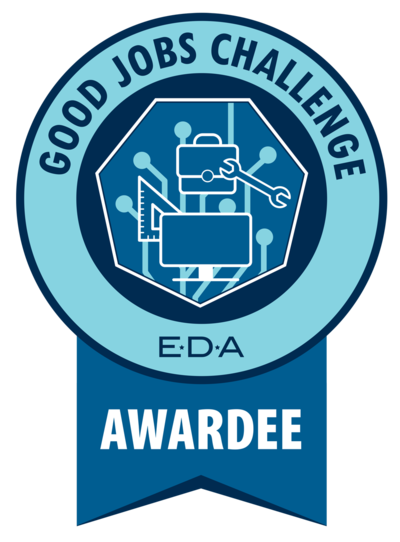Good Jobs Metro Boston Coalition
Connecting residents to quality, good-paying job opportunities in child care, clean energy, and healthcare.
The Office of Workforce Development (OWD) was one of 32 organizations selected as a Good Jobs Challenge grantee out of 509 applicants. As a result, the U.S. Department of Commerce’s Economic Development Administration (EDA) awarded OWD $23M. This is a once-in-a-generation investment to transform Boston's communities and local economy.
The Good Jobs Metro Boston Coalition aims to train and place residents in 4,618 quality jobs over the three-year grant period. Our targeted industries are childcare, healthcare, and clean energy.
We serve:
- the unemployed and underemployed
- incumbent workers
- community college students, and
- BIPOC individuals in the Greater Boston Region.
About
What is the Good Jobs Challenge?
The Good Jobs Challenge is a $500 million investment from the U.S. Department of Commerce’s Economic Development Administration (EDA) to provide opportunities for training and placement into good, quality jobs using a sector strategy.
What is a Good Job?
- A good job exceeds the local prevailing wage for an industry within the region.
- A good job provides basic benefits (i.e., paid leave, health insurance, retirement and savings plan) and/or is unionized.
- A good job helps an employee develop the skills and experiences necessary to advance in their career.
How We Help?
- Provide trainings for quality jobs in childcare, clean energy, and healthcare.
- Provide job interview preparation and job placement.
- Work with partners to scale training models and provide pathways to career mobility.
Apply to Child Care Programs
Child Care ProgramsJVS Boston's 10-week Early Childhood Education Training Program is designed to place interested participants into full-time, benefitted jobs in the Early Education field by delivering job readiness training, a monetary stipend, enrollment into a tuition-free 3-credit Child Growth and Development course, and job placement and coaching support.
Apply to Clean Energy Programs
Clean Energy ProgramsRenewable Energy Technology is one of the high-demand concentrations within Benjamin Franklin Cummings Institute of Technology’s Engineering Technology associate degree program. Participants will prepare for a career:
- assembling
- installing, and
- maintaining green energy generation systems, including solar/photovoltaic and wind turbine systems.
The Benjamin Franklin Cummings Institute of Technology 800-hour certificate program in Practical Electricity is designed to provide students with the knowledge and hands-on skills to become successful HVAC&R (Heating, Ventilation, Air Conditioning, and Refrigeration) technicians.
This program is a 12-month, part-time Certificate of Proficiency in Practical Electricity. It is intended for participants with no formal training in electrical theory or code. However, the program is also for participants who shadowed another electrician or learned basic principles at a vocational/technical school, and want to continue their formal training.
The Electrical Vehicle (EV) Technology concentration within the Benjamin Franklin Cummings Institute of Technology's acclaimed Automotive Technology associate degree program will prepare students to work as entry-level Hybrid/EV and charging station technicians with a focus on:
- Electric Vehicle Safety
- Charging Station Installation and Maintenance
- Battery Technology, and
- Battery Management.
Building Energy Efficient Maintenance Skills (BEEMS) is a hands-on innovation center where participants learn the basics of Carpentry Plumbing and Electricity in a green-efficient way. The free course includes over 300 hours of classroom instruction. Classes are taught in the late afternoons by certified instructors from 4 - 8 p.m. twice a week.
BEEMS also offers an efficiency class once a week via Zoom. Upon course completion participants are placed in employment as a maintenance tech with one of the many major property manager groups, hotels, hospitals and universities. What separates BEEMS from other maintenance trainings is its emphasis on building efficiency. Participants can make $20-$28 an hour as a starting salary.
To apply, fill out the intake form:
The Weatherization Training Program is an intensive, hands-on training program located at the Asian American Civic Association Innovation Center. The courses are taught by certified instructors and offered from 8 a.m. to 4 p.m., imitating a work schedule.
Participants will learn the basics of insulation and air sealing, which has an anticipated huge demand for these positions. From these positions participants can become a crew chief. The training also includes assistance with resume and job placement.
To apply, fill out the intake form:
The Marine Technician Program at Bunker Hill Community College enables participants to learn the fundamentals of outboard and inboard engine repair and prepares students to use marine systems effectively to be stewards of the environment.
Successful completion of the program will result in an industry recognized credential in Mercury marine systems. The marine industry offers good jobs with projected 7% growth and salary ranges from $45,000 to $50,000 per year commensurate on experience.
Apply to Healthcare Programs
Healthcare ProgramsParticipants will learn the skills needed to perform clinical procedures in various medical office settings, such as recording medical histories, explaining treatment procedures to patients, preparing patients for examination, and assisting physicians during the examination.
Participants will learn medical knowledge and hands-on skills to perform or obtain technical diagnostic testing. Participants will master performing direct patient care, such as providing rehabilitation services, delivering basic bedside care, collecting laboratory specimens, performing Phlebotomy, and conducting EKGs.
The Patient Care Technician (PCT) program is a paid three-week training at Beth Israel Deaconess Medical Center. Participants will learn acute skills to assist patients with daily living activities, such as taking blood sugar and blood pressure, taking EKGs, and reporting any changes in patient's condition to RNs and health care team members. PCTs work on inpatient floors and collaborate with nurses to support patients. The training begins on October 30, 2023.


